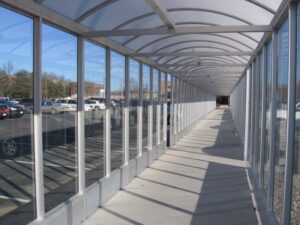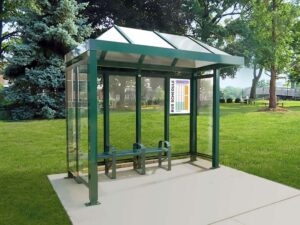Prefabricated vs. Custom Shelters: Which Is Right for Your Business?
A well-designed shelter is more than just a protective structure—it’s a long-term investment that can impact efficiency, cost, and usability. Businesses, municipalities, and institutions looking to expand their outdoor infrastructure often face a crucial decision: opt for prefabricated shelters or invest in fully customized builds.
While both options offer distinct advantages, prefabricated shelters provide quick deployment, lower costs, and flexible configurations that suit various industries. Understanding the key differences in cost, installation time, durability, and customization options can help businesses determine the best fit for their needs.
The Case for Prefabricated Shelters
Prefabricated shelters are factory-built structures designed for quick installation and immediate use. These modular solutions are made from durable materials such as aluminum and tempered glass, ensuring longevity and weather resistance. The streamlined production process allows for consistent quality control and significantly reduces the time from order to installation.
By contrast, custom-built shelters require extensive planning, design work, and on-site construction. While they offer complete creative freedom, the higher costs and longer timelines may not be ideal for businesses needing immediate solutions.
Faster Installation, Immediate Benefits
Speed is a defining advantage of prefabricated shelters. Unlike custom builds, which can take weeks or months to complete, prefabricated shelters are delivered ready for assembly. Businesses and institutions can expect a smooth process:
- Manufacturing & Delivery: Once an order is placed, production begins, ensuring precision and efficiency. The shelter arrives on-site, pre-engineered for fast setup.
- Quick Assembly: Installation takes just days, reducing disruptions and allowing immediate use.
This swift turnaround is particularly valuable in sectors where timing is critical. Transit authorities, for example, can quickly install transit shelters to enhance commuter convenience. Healthcare facilities can deploy temporary waiting areas, while universities can create outdoor study spaces without lengthy construction delays.

Photo by Handi-Hut
Cost Efficiency and Budget Considerations
Cost plays a major role in shelter selection. Prefabricated shelters offer a clear financial advantage over custom-built options, primarily due to:
- Lower Labor Costs: Pre-assembled components require minimal on-site labor, reducing expenses.
- Material Savings: Standardized production results in reduced waste and optimized resource usage.
- Elimination of Design Fees: Unlike custom shelters, prefabricated models do not require extensive architectural planning or one-off designs.
Custom-built shelters, on the other hand, involve more complex construction, skilled labor, and unpredictable expenses. Delays or modifications can further inflate costs, making them less viable for organizations working within tight budgets.
Durability and Long-Term Maintenance
Structural integrity is essential for shelters exposed to diverse weather conditions. Prefabricated shelters from Handi-Hut are built using high-quality aluminum, tempered glass, and corrosion-resistant coatings to withstand harsh environments with minimal upkeep.
Custom-built shelters may use unique materials that require specialized maintenance. Over time, these additional upkeep costs can accumulate, making prefabricated solutions a more reliable and cost-effective choice.
Customization Without Complexity
While prefabricated shelters follow modular designs, they still offer a range of customization options to fit specific needs. Businesses and municipalities can choose from various features, including:
- Size and Layout Adjustments: Accommodate different capacities and space requirements.
- Branding & Aesthetic Enhancements: Select finishes, colors, and designs that align with branding.
- Added Functional Features: Integrate security elements, lighting, or bike racks for enhanced usability.
Handi-Hut’s bike shelters, for example, offer scalable configurations for transit hubs, campuses, and business districts. Smoking shelters can be tailored to meet workplace regulations, while covered walkways provide protection from the elements without extensive construction.
By comparison, fully custom-built shelters demand extensive design work and project management, which can introduce costly delays when specifications need to be adjusted mid-project.
Prefabricated Shelters in Public Spaces
Prefabricated shelters play a significant role in urban and corporate settings. City planners and businesses increasingly adopt these structures for public convenience, offering benefits such as:
- Transit Stops and Bus Shelters: Providing safe, weather-protected waiting areas for commuters.
- Outdoor Dining Spaces: Restaurants and cafes use prefabricated shelters to extend seating areas year-round.
- Employee Break Areas: Workplaces enhance outdoor spaces with covered seating for staff comfort.
- School and Campus Facilities: Universities integrate shelters for study spaces, shuttle stops, and bike parking.
These real-world applications highlight the versatility and efficiency of prefabricated solutions compared to traditional construction methods.

Photo by Handi-Hut
Sustainability and Eco-Friendly Considerations
Sustainability is a growing priority across industries. Prefabricated shelters support eco-conscious initiatives through:
- Reduced Waste: Factory production optimizes materials, minimizing excess and environmental impact.
- Energy-Efficient Design: Thoughtful engineering improves insulation and reduces energy consumption.
- Recyclable Materials: Aluminum and glass components contribute to sustainable urban planning.
Custom-built shelters often require more raw materials and generate additional waste, making prefabricated options a responsible choice for businesses focused on environmental impact.
Long-Term Value and ROI
When evaluating shelter solutions, businesses should consider long-term return on investment (ROI). Prefabricated shelters provide value beyond upfront cost savings:
- Reduced Disruption: Minimal installation time means less operational downtime.
- Scalability: Prefabricated models can be expanded or relocated as business needs change.
- Consistent Quality: Factory-controlled manufacturing ensures high-quality builds.
Comparatively, custom-built shelters may present unexpected maintenance or modification costs down the line, affecting overall ROI.
Making the Right Choice for Your Business
Investing in the right shelter solution depends on priorities like budget, timeline, and long-term maintenance. Prefabricated shelters provide businesses with a balance of affordability, efficiency, and durability, making them an excellent choice for those seeking reliable outdoor infrastructure without the complications of custom construction.
Handi-Hut specializes in prefabricated shelters that enhance public spaces, transit systems, corporate campuses, and more. Whether you need a secure bike parking solution, a covered walkway, or a weather-resistant waiting area, our modular designs deliver quality and functionality with rapid installation.
Explore our full range of prefabricated shelters and find the ideal solution for your business. Contact us today to discuss your project.
